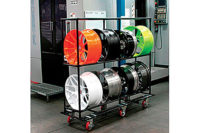Some manufacturers do more than just practice lean manufacturing. They help other manufacturers achieve it. A good example is Hamilton Caster & Manufacturing Co., which recently helped Cummins Inc. improve lean practices at one of its engine manufacturing plants in South Carolina.
For many years, Cummins used a tugger to tow heavy carts full of diesel engine parts to workstations along an assembly line. The parts sat in bins on conveyor tracks built into the cart base. Unfortunately, loading the cart was very time-consuming because each part had to be placed in a separate bin to ensure that the part was used in the correct sequence during assembly.
With the plant’s recent move toward lean manufacturing, the company built an adjacent warehouse and hired a third-party logistics company to optimize part loading. Cummins also hired Hamilton Caster to develop a part-delivery system that supports lean manufacturing logistics.
The system includes a custom trailer and two rotating carousels that hold parts and ride on the trailer. Thus far, Cummins has purchased 68 trailers with accompanying carousels.
The all-steel trailer has a 2,000-pound capacity and it features a 40-inch-wide by 90-inch-long deck, base and top frame. Its base includes a bottom frame, wheels and steering mechanism. The carousels are bolted to the top frame, which is bolted to the base.
Each carousel features three tiers that hold 48 parts. Made of sheet aluminum, the carousels are loaded with parts in the plant’s warehouse then locked so they don’t rotate during transit.
Cummins says the trailer provides much more versatility than the old carts. A front towing tongue and rear pintle hitch enable the company to connect as many as six trailers into a train. Four-wheel steering enables the train to track in the same pathway around turns, minimizing aisle-width requirements.
The tongue is reinforced with a forged-steel loop for extended wear life. To enhance worker safety, the tongue is stowed in the vertical position, held in place with magnets and hinged to prevent inadvertent drops.
After the trailer is positioned near a workstation, the worker can easily move the trailer closer because of the trailer’s four easy-rolling wheels. He actuates brake pedals on the two front wheels to lock the trailer in place.
The worker then unlocks each carousel, which spins easily and provides ergonomically correct access to the parts. Each part sits on a 1-foot-square adjustable shelf that slopes slightly downward and is lined to protect part finish. Drainage at the center of each carrousel prevents any pooling when the trailers are washed.
To ensure easy rolling, the trailer features 12-inch-diameter wheels with a Poly-Soft tread. Hamilton selected this tread because it requires only about half the force of a standard polyurethane tread to initiate movement. In addition, it is more resilient, quieter and repels small particles better.
Cummins also likes that it can quickly switch out a carousel when the company changes engine models on an assembly line. The four bolts that hold the top frame in place are removed, and the carousel is forklifted off the trailer from the side. A different carousel is placed on the trailer and bolted in place. Metal guards along each side protect tie rods from forklift damage.
Founded in 1907, Hamilton Caster also offers standard and custom casters, wheels and carts. The company serves manufacturers in many industries, including automotive, aerospace, defense and heavy machinery.
For more information on trailers, casters and wheels, call 888-699-7164 or visit www.cartsandtrailers.com.




